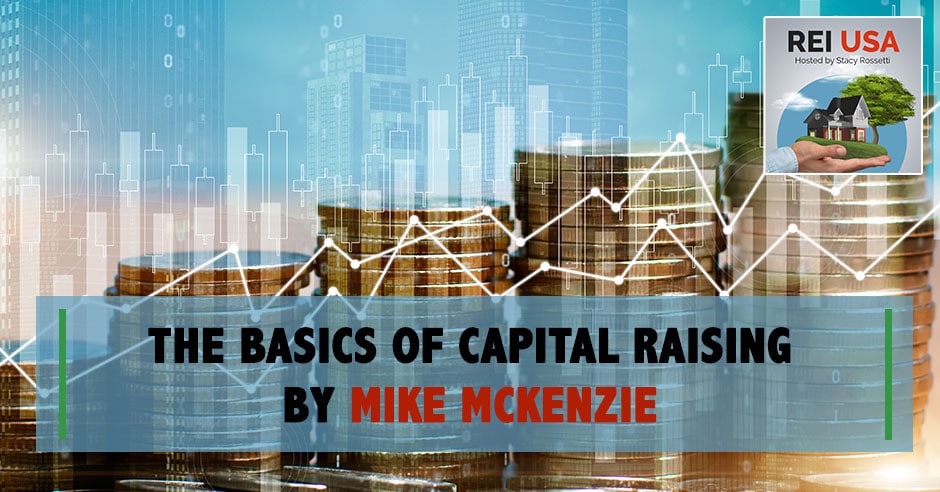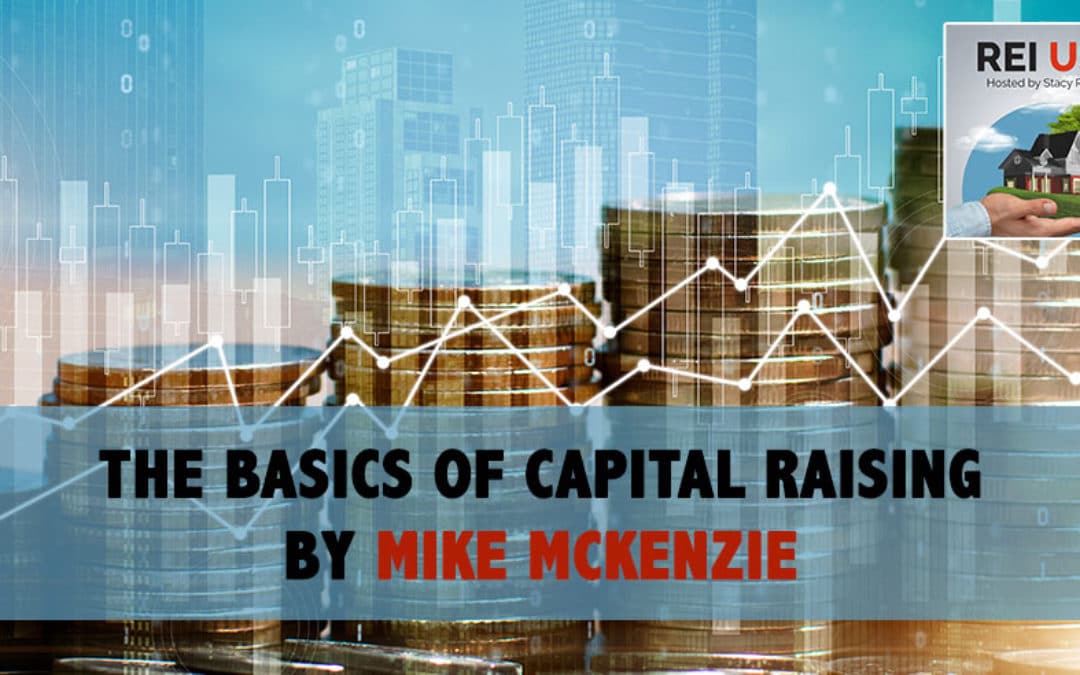
Raising capital is so important for our business so that it can get off the ground and expand in the way we want. Today, real estate investor Mike McKenzie shares his knowledge on the basics of capital raising. He goes deep into what to prepare before raising capital and identifying your target investors. He also shares a walkthrough of his first capital raising round.
—
Watch the episode here
Listen to the podcast here
The Basics Of Capital Raising By Mike McKenzie
Mike teaches land for REI USA. I appreciate you hopping on. When do you usually teach?
I teach the second Monday every month at 7:00 PM Eastern Time. Be sure to jump on it. We talk about everything involving land and some unique things out of pocket and out-of-the-box ideas when investing in land. We always have fun with it.
What’s going to happen to the land market?
When the market takes a turn, it’s usually the first part that takes a little bit. I don’t see a huge downgrade in it. In talking and selling properties, we don’t have a lot of fear in that, at least talking to different buyers all over the country. Everybody still seems confident. I’m feeling good about it.
I feel like the land is so expensive now.
It is expensive. That’s for sure. It’s finding those pockets and those deals.
If you’re interested in land, hop on and hang out with him. He’s a wealth of information. You can go ahead and start your presentation.
It’s great to be here. I’m glad I’m part of it. I want to do something not unique. Rather than teach you how to raise capital, I got out of a capital raising thing for one of my companies. I want to take you through those steps and how I did that. It is the largest capital raising thing that we’ve done. We’ve done short-term capital raising, but this was longer-term capital raising that we did. It was a unique situation. I will show you a little bit about it.
[bctt tweet=”The first thing you need to think about is who do you talk to about finding capital?” via=”no”]
It’s a case study on how to raise $200,000. Before I get into that, the first thing I had to think about is who do you talk to about finding capital? The key thing that I wanted was silent investors. I did not want investors telling me how to run my project. It’s not that you don’t value their opinion, but the investors I’m looking for may not be necessarily educated in the real estate world as much as they are in whatever field they’re in.
A couple of places that come to mind are family members. You can look at family members in two different ways because family members can be what we call a warm list, not a cold list of possible people. For family members, you may know if they’ve got some capital they may want to lend. There are two ways that you approach family members. You can practice on strangers and save your warm market when you’re well versed with your pitch.
That means go to some strangers, your cold leads, and tell them what you want to do. We’re going to get into what you need to talk to them about or what you should show them to make yourself look credible. That’s one way. Get it down, and fine-tune it before you talk to family members. Other options some folks look at, I’d rather talk to my family and friends because they’re going to be more forgiving, but at the same time, more trusting of me. I agree with that. That’s very true. I’d rather get everything down. My family is probably going to be more honest with me as well.
That’s something to think about. Doctors, attorneys, and CPAs are good people to talk about because most have some money. Look for investments. Everybody wants to say they’re in real estate, but most doctors, attorneys, and CPAs don’t necessarily have time to be hands-on in real estate. If they can invest with you and you’re invested in real estate, they can go to their clubs or do their dinners and say, “I have a practice, but also have some real estate,” and they’ll go with that. Go to some high-end restaurants and bars and maybe sit in a bar, drink, and engage in conversation with people. The greatest thing you can do is talk with people, get a conversation started, and find out what they do. Find out if they do have an interest in investing in real estate.
A couple of other things, high-end golf clubs, country clubs, that’s always a pretty decent place. You go to some golf clubs. Not all high-end golf clubs are completely private. A lot of them do guests play as well. Go in there. Afterward, hang out a little bit and talk to people. Don’t be scared to approach people. That’s the big thing. The worst thing that they can do is tell you no. Don’t worry about that.
High-end meetups, what did I mean by that? Maybe high net worth people that are having meetups somewhere. Talk with those folks, introduce yourself, and tell them what you’re about. Bankers is another one. Some people don’t think about bankers, and that’s a big one. Bankers may not be able to help you directly, but they may know people who will. What I encourage you to do is talk, go in, and introduce yourself to multiple bankers and say, “This is what I’m looking at, and this is what I look to do.” Does your bank have programs that can help either a beginning investor or investors who’ve been in it for a while, wherever you are in your real estate walk?
They get to know a little bit about you. They may say, “We don’t have a program here, but I know some investors are looking for different deals. Let me put you in contact with them.” Don’t discount that. 401(k) administrators and self-directed IRAs, if you’re not familiar with them, what they do is you can take and control your IRA money, and you choose what you want to invest it in.
It’s a cool thing. As you grow your business, I encourage you to create your own self-directed IRA. Contact some of those administrators. You can google them. There are multiple ones out there, senior communities and retirees. I’m not talking about my assisted living here. I’m talking about the Del-Webb-style communities. I’m talking about things like that, where they’re planned communities. A lot of times, it’s 55 and older. They have to be a buy into it, so that helps.

Capital Raising: Everybody wants to say they’re in real estate, but most doctors, attorneys, and CPAs don’t necessarily have time to be hands-on in real estate.
Seek out some of those neighborhoods, so think about it. How did I raise $200,000? I’ll be honest with you. When I first started, thinking back, it was very scary. Here’s a key thing that you want to do. Start conversations before you find the property. Before I find the property, I own it. In this case, I’ll give you a little backdrop about this. My primary business is land.
I teach about land and other real estate stuff as well. I am in my business because we’re diversifying my companies, and this was an opportunity for my son to go into the business. He’s been after me to get into the real estate business with me. We determined that we wanted a short-term rental arm of our business. We own a short-term rental company, 50/50.
They brought him into the game of the real estate world. We talked with people before. How we did that is we both brainstormed, “Let’s write down a list of people that we know have access to capital or know people that do have access, and let’s target them first.” That’s our warm list. Start with that warm list.
Talk to those people and tell them what you want to do, “I’m looking to invest in this. I’m looking for either short-term or long-term. What type of investment are you looking for?” Even though your warm list, what you’ll often find may not be the right opportunity for that particular person on your list. Many times, they may know someone that may work a little better for you, so you can reach out to them as well. That’s a good way for the candidate to stand on your warm list.
I’m a part of FEAR MASTERMIND. It’s a real estate mastermind group. That, to be blatantly honest, was my best connection. Quite frankly, that’s where the money was raised. It was through connections within the mastermind. We have another member of the mastermind who raised $150,000 in our last meetup in the room. Connections, groups, and things like that are where you can make your connection and get those different raises of money.
What do I share with investors? I can’t come up to you and say, “I’m looking at doing some real estate investing. My goal is $200,000. Can you write me a check?” Most are going to say no at that point. I want to tell them who I am. I may not know these people personally. I probably don’t. I got to let them know who I am, my background, what I plan to do, who’s my team, and those sorts of things. The first thing I start with is a real estate resume.
What’s a real estate resume? It’s exactly what we’re talking about. It’s like a resume you build for any job. It’s laid out a little bit differently. Here’s mine. This is the one I’ve used. The first part of it tells who I am. I have been full-time real estate since 2011, bought my first property in 2002, and different types of things I’ve done in real estate. You may say, “I have not done a lot in real estate.” That’s okay. I’ll get down to where you can add a little more credibility even if you’ve not done a lot.
The one thing you don’t want to do is not embellish this. Be honest on it because people can go back and track this stuff. Some investors have a significant amount of money. That’s what they’re probably going to do to make sure who you are. I’ve been surrounded by great people. The second part is my background. I have a background in law enforcement. I have a BS and an AS degree. I quickly go into my real estate background. I want to give them a little bit about my background in the pre-real estate, but not a lot. There’s a thing or two.
[bctt tweet=”The one thing you don’t want to do is embellish things. Be honest because people can go back and track stuff.” via=”no”]
Where I got into it, I got bigger into the group and became a senior acquisition manager for a real estate company. My team purchased over $10 million worth of a real estate. I personally didn’t purchase it. I didn’t use a dollar of my money. My team didn’t use their money. We used the investor’s money. Still, we purchased and acquired that much real estate. That’s also where I started mentoring people. I got into that.
You then start getting into more chronological order of what you’ve done. In 2014, I had a company called Carolina Real Estate Solutions. In 2018, I sold that part and created MLM Consulting. It shows that I’ve got consistency in what I’m doing. While I was with the Carolina Real Estate Solutions, I talked about how much I consulted, bought a mobile home park, some of the profit in that, what we did as a whole in that company, and things like that. I got into my new company, my parent company, and the next company I owned. We focus on land acquisition.
It continues to be successful, train off-hours, and spoken at events. Lastly, my company has 50% ownership in a real estate mastermind. I talk about that. What does that do for me? That shows that I surround myself with other like-minded investors so that I’m not out there on my own doing things. The next thing, in 2021, me and my son created J&M Luxury Vacation Rentals.
I’m leading into why I’m going to need this money. It gets into why I created it when my son wanted to create a portfolio. We both benefit from it. Investors’ capitals are safe, and their investments are taxed specifically on real estate. Somebody is not just giving me money, even before I find the property. They may say, “I can give you $50,000 or $100,000.” That’s great. Don’t take that money upfront. Wait.
If they say that they’ve got $100,000 to invest in, do not take $100,000, take $80,000, $90,000. Don’t take the whole $100,000. It’s a mind thing. Leave them with a little bit. In my experience, that always helped. That’s the next thing. I get into what I did with rental property. This is where I breakdown my experience. I had real property as well. I started in 2002. I started flipping houses and took several real properties.
I talked about where I got into that in 2014 and 2017. We were financed by loans from private individuals. It shows that I’ve had working relationships with private funding in the past. I talk about $450,000 in profits. It’s the same thing with the mobile home park up here. It was private funding and commercial real estate. In the mobile home park, I talked about here as well.
Mobile was financed through private individual funding. It was sold at twice the value of the purchase price. Our private investor was fully paid as contracted interest on his money and received his initial investment back. He got his money plus interest quicker than he even contracted it out. That’s something to think about. You get into consulting and teaching. I have a background, and I do that.
Those are some of the things that you do with your real estate resume. The next thing you want to have is an executive one-page summary. We can take a look at one of those. This is a pre-need thing because this talks about the shorter thing. It talks about a lot more of the specifics of what you’ve got going on. I’ll share this. It gives you an overview. What are we seeking? Are we seeking investors with a 6% to 8% rate of return? Did I expect to get a 6% rate of return? Not, but I can at least start there.

Capital Raising: If you got a good relationship with bankers and they get to know a little bit about you, they may say, “We don’t have a program here, but I know some investors are looking for different deals. Let me put you in contact with them.”
Ideally, we’re going 3 to 5 years of investing to give us enough time to do what we want. One thing we did is we wanted a minimum investment of $50,000. We changed that up as we went a little bit, but we didn’t want multiple $10,000 here and there. If you get multiple investors, you get into SEC rules and things like that. I’m not into that, but we didn’t want to deal with that.
We also talk right here. We do have shorter-term scenarios and the same rate of return. Our strategy, what do we plan on doing? What are our long-term goals? We want to purchase $2 million to $5 million worth of property. They offer stability, but there are some ways that we can add value. Maybe it’s a rehab unit, or the vacancies are too low or improperly marketed, those types of things.
Hopefully, when the market corrects itself, maybe something like this, motivated sellers need out. We seek assets located in areas that have a proven short-term rental history. We do that. This right here to me, the team, that’s a key thing. I say that because, at this point in time, when we were asking for money, I had properties that my family and I used in the area that we were looking for. We didn’t rent them out. There were private properties.
The thing is, I didn’t have the experience. I had to surround myself with the correct people that did have the experience. The managing members are the father and son. I have a track record of growing a successful business in real estate and experienced short-term rental investors, Nathan Amarok, Tim Nichols, and Jack Nichols. He consults with the team to make sure our objective is reached and successful.
The short-term rental investors have experienced not only in the US but throughout the world owning and managing short-term rental properties. I’ve got key consultants that I can go to who know the business, not only in the US but worldwide. Their knowledge and advice are invaluable to our company. Who else is on my team? I have experienced real estate stay attorneys that had law firms.
Harry Marsh is a friend and advisor and a tax advisor. I have a well-rounded team of people who can help consult me in the legality areas, the tax area, and the actual running of the business. Talk about investments secured by real estate assets and things like that, and give them a number to call. Those are some of the key things.
The last thing is email templates. It’s a couple of templates that you can use. I’ll put my information here at the end of the presentation and how you get ahold of me if you want copies of this. I don’t mind sharing this. These templates and things were shared by investors with me, and I don’t mind sharing them with others. You have to create other basic templates for it.
These things are very important to me because they provided credibility to who I was. I had experience in real estate, but not the type that I was asking money for. I have investors for that other deal. That was my next thing. What was the result of my fundraising? What did I do? How did I do it? I ended up with three investors. One investor finally ended up at $153,000. Investor two was $17,000. The third investor was $30,000.
[bctt tweet=”Surround yourself with other like-minded investors so that you’re not out there on your own doing things.” via=”no”]
We initially thought that investor one was going to put in more money. At the last minute, he didn’t. This whole thing came together because of investor two, a fellow member of a mastermind that I’m a part of, and knew the investor one. Investor two was my warm list. You want to put some skin in the game. He’s got other things going on, but he had access to other capital. I knew that. He referred me to these folks. These folks don’t know me, but they know investor two. With that connection, they were willing to lend $153,000 on the deal.
The third investor is a friend and fellow investor. At the last minute, we needed the additional $30,000. We had multiple cash on the street for land deals. We were getting close to the minimum amount to keep in our bank accounts. I don’t like to go below that. I reached out to my buddy and said, “I’m looking for a $30,000 investor to plug this hole quickly.” He got somebody to talk to. He said, “I’ve been wanting to do business with you forever. This seems like a good opportunity. Send me your wiring information. It will be there in the morning.”
He didn’t want to talk terms or anything. That’s not advisable in most situations, but we have a good relationship. The next thing I got up that morning, $30,000 was sitting in the bank account. The structure of the deal is investors 1 and 2 will be cashed out within 12 months. We’re paying them an interest-only amount of money. Because this was a newer deal for the investor one, we agreed on a 10% interest rate, a little bit higher than I wanted it to go.
I also know investor one has access to a lot more money than that. I would rather pay him a little bit more, maybe on the first one, to develop that good working relationship with him where there are other deals in the future. 1 and 2 will be cashed out like that. Investor 2 came in because investor 1 wanted them to have a little bit of skin in the game too. He took a little bit in it.
Investor three probably is going to some profit-sharing because he wants long term. He doesn’t want his money back anytime soon. He wants to build and do some other things. I appreciate that. I appreciate his trust. That’s a unique situation. It’s not at all very common. The last thing, what does the finished product look like? This is it. We didn’t buy the whole building. We bought one condo in it. It’s on the short-term rental market and doing very well.
It took legwork to get to that. It says $200,000. I raised every single bit of the purchase price in closing. It cost us $193,000 for the unit. Closing costs were $4,000 or $5,000. We had $200,000. We invested another $25,000, rehabbing the unit and new furniture and all that mess. That’s where our skin in the game came in the rehab money financed through us. The entire purchase was through investor money that we didn’t have to take out of our pocket, which came out good.
That’s how I’ll raise the money. It was a learning thing as I went, but I’ve shared this before. I want to share my experience. Did I do it perfectly? I’m sure that I made mistakes along the way. I’ve learned, but these situations helped. It worked, and the money became available. If you are interested in wanting a copy of any of that, you certainly can email me.
I’ll be sure to send you copies of those resumes, a one-page executive summary, and the email templates. I can do that. If you’re interested in a land sale, hit up my website. You can look at that. Every second Monday, 7:00 PM Eastern Time, we talk about unique things, not just the basics of land, but we dive deep into each part of it, how to do it, and the most effective ways to do it in this world.

Capital Raising: As you grow your business, create your own self-directed IRA but contact some of those administrators.
I was going to ask you. How much did you purchase that condo for?
The purchase price was $193,000. In the market we’re in now, we paid $6,000 over ask, which is very hard as an investor, even to pay ask on a price, let alone pay over. It was all about the numbers and where they were. The closing cost was $4,000 or so.
Is that a one-bedroom?
It’s a one-bedroom. Those units in the condition that we bought ours are now selling for $240,000 to $250,000.
I always pay attention to Austin because I’m interested in Austin. It’s right on the water, but it’s in Lake Travis. It’s a 1-bedroom, 426 square feet for $240,000. How big is yours?
Ours is probably 600 to 650 square feet. The rent that thing brings in is insane. I personally would not pay that nightly to stay in my unit.
I like to compare markets to see what they’re doing. Hop on and hang out with Mike. He is a once a month here on land. He’s in the Facebook group if you need to contact him too. I appreciate all your time. Thank you for showing us all that.
Thank you.
Important Links
About Mike McKenzie
 Mike McKenzie comes from a family that is rooted in entrepreneurship & real estate. Growing up, Mike’s parents owned a business as well as a rental property. This is where Mike was first introduced to the world of creating his own path. Mike graduated high school & attended the University of North Carolina at Charlotte where he earned a BS degree in Criminal Justice with a minor emphasis in International Politics.
Mike McKenzie comes from a family that is rooted in entrepreneurship & real estate. Growing up, Mike’s parents owned a business as well as a rental property. This is where Mike was first introduced to the world of creating his own path. Mike graduated high school & attended the University of North Carolina at Charlotte where he earned a BS degree in Criminal Justice with a minor emphasis in International Politics.
After graduating from college, Mike started a career in law enforcement. Mike served in several specialized units as both an investigator & supervisor. This is also where Mike developed a passion for teaching & sharing with others. During his career, he was able to mold & mentor new officers, as well as experienced officers coming into specialized divisions. He also taught courses in the Basic Law Enforcement Training Academy to young adults that were starting their careers in law enforcement. Mike still holds his active law enforcement certification to this day.
During his career in law enforcement is when Mike first started investing in real estate. He completed his first investment deal in 2002. Mike started out purchasing a rental property as a means for additional monthly cashflow. In 2011, Mike decided to become a real estate investor full-time. Since becoming a full-time real estate investor, Mike has been involved in multiple types of real estate including: rental property; single family fix & flip; commercial resort property building project; mobile home park ownership; & land investing. For several years, Mike managed a staff of acquisition managers for a large real estate investing firm. He personally trained these managers in the art of acquiring properties at a deal. His team was responsible for purchasing millions of dollars worth of real estate. Many of those acquisition managers went on to create their own companies & become successful real estate investors themselves.
Mike’s passion for teaching others what he knows continues to this day. Even though Mike runs his own successful real estate investing company (MLM Consulting, LLC), he still has taken the time to teach others about his passion & skills in real estate. Mike has formally coached real estate investing since 2013, & continues doing so. Mike has logged well over 3,500 coaching sessions with multiple students.
Mike has also spoken at numerous real estate events throughout the country. Mike enjoys the opportunity to speak to new & seasoned investors. In 2019, Mike was named the South Atlanta Real Estate Investors Association Guest Speaker of the Year. He continues to speak at events whenever he is invited. Mike is quoted in saying, “I love the opportunity to meet & share my story & real estate knowledge with other like-minded real estate investors.”
Mike is also continuously keeping himself updated on the latest information & trends in real estate. Mike understands the importance of education & mentorship in this business. He was very blessed & fortunate to have had key mentors throughout his real estate path that has taught him a tremendous amount about real estate investing the correct way. He credits all of those mentors for his success today.
Mike continues to enjoy the fruits of a successful real estate investing & consulting business. He recently even started a real estate mastermind for seasoned investors called, F.E.A.R. Mastermind. It’s a perfect addition to his already successful real estate coaching program. As he continues to build his business, he also enjoys spending time with his beautiful family. Mike is married & has a son, daughter, & step-daughter. He loves spending time with them. He also has a huge love for the beach & spends a large amount of time there enjoying family & friends, as well as the sun & sand!!!! He also loves playing golf & visiting casinos, including his favorites in Las Vegas!!!!

